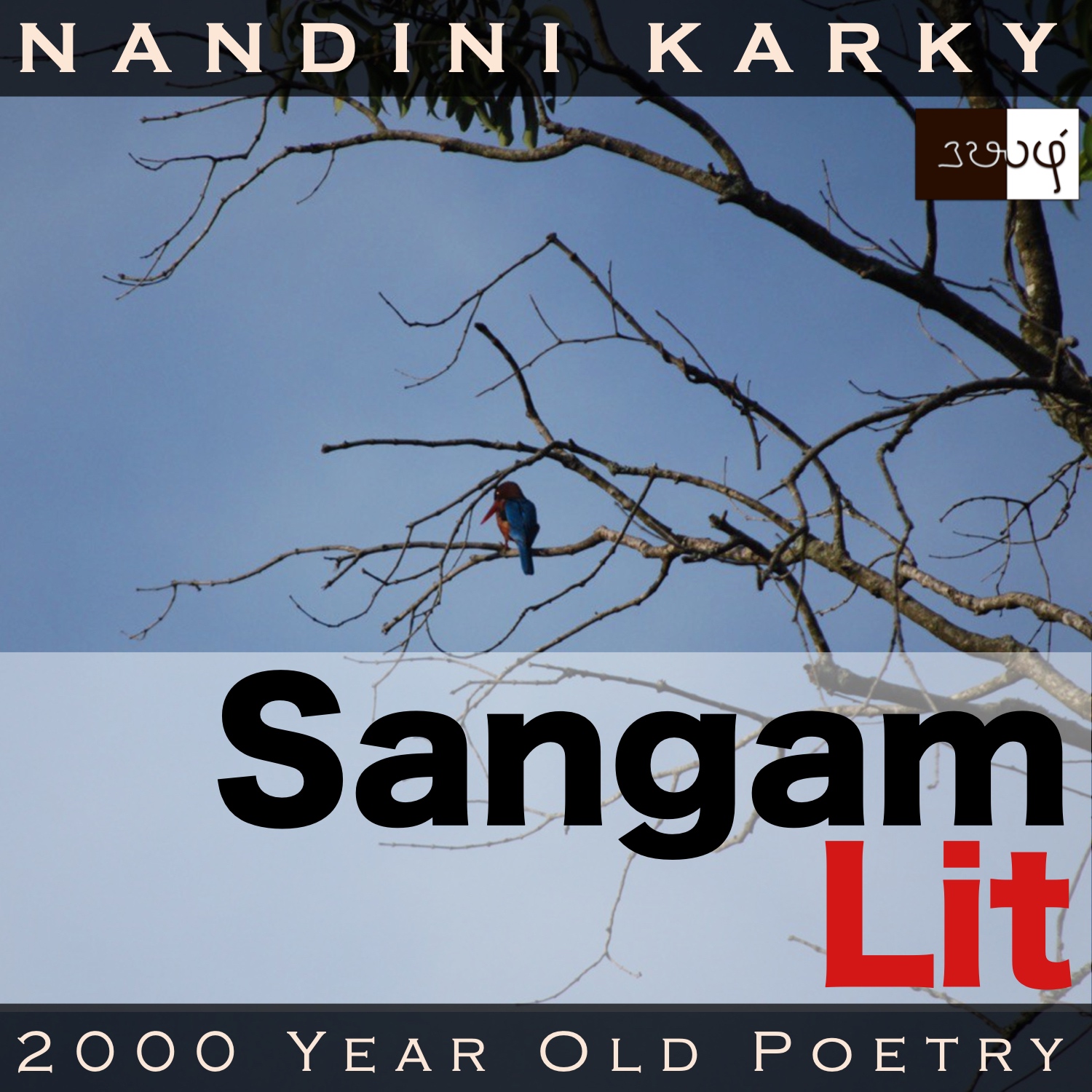Podcast: Play in new window | Download
Subscribe: Apple Podcasts | Spotify | Amazon Music | Android | iHeartRadio | Email | TuneIn | RSS | More

In this episode, we relish the metaphors in nature, as portrayed in Sangam Literary work, Natrinai 107, penned by an anonymous poet. The poem is set in the ‘Paalai’ region or the drylands and revolves around the theme of separation. Speaking in the voice of the lady to her confidante, the poem expresses the ironic situation the lady finds herself in, after the man parts away to go on a journey.
உள்ளுதொறும் நகுவேன்-தோழி!-வள்உகிர்ப்
பிடி பிளந்திட்ட நார் இல் வெண் கோட்டுக்
கொடிறு போல் காய வால் இணர்ப் பாலை,
செல் வளி தூக்கலின், இலை தீர் நெற்றம்
கல் இழி அருவியின் ஒல்லென ஒலிக்கும்,
புல் இலை ஓமைய, புலி வழங்கு அத்தம்
சென்ற காதலர்வழி வழிப்பட்ட
நெஞ்சே நல்வினைப்பாற்றே; ஈண்டு ஒழிந்து,
ஆனாக் கௌவை மலைந்த
யானே, தோழி! நோய்ப்பாலேனே.
Smiling at the familiarity of the phrase ‘உள்ளுதொறும் நகுவேன்’ meaning ‘I laugh whenever I think about it’, we step into this verse. We meet with ‘பிடி’ or a ‘female elephant’ and greet a new tree, ‘பாலை’ or the ‘Ceylon Ironwood’. The transient nature of wind is captured by the phrase ‘செல் வளி’ meaning ‘going wind’. Yet another tree, we see in ‘ஓமை’ or ‘toothbrush tree’ along with a ‘புலி’ or tiger. The poem is rich with the different rhythms of ‘உள்ளுதொறும் – வள்உகிர்’, ‘கல் இழி – ஒல்லென – புல் இலை’ as well as ‘ஒல்லென ஒலிக்கும்’ and ‘புல் இலை – புலி வழங்கு’.
Moving from music to meaning, we learn that the man and lady have been in a love relationship and the man has set out on a journey through the drylands to gather wealth. One day during the separation, the lady turns to her confidante and says, “I laugh whenever I think about it, my friend! Owing to the attack of the female elephant with huge nails, the branches of the ‘paalai’ tree, turn white, without moisture. From these branches, hang dried-up fruits that look like a blacksmith’s forceps and white flower clusters. The hot wind that moves through the trees shake the dried-up fruits amidst the leafless branches and evoke the rustling sound of a stream that drags down rocks and pebbles. It’s in such a drylands path with the small-leafed ‘omai’ trees, where tigers roam, my beloved walks on. My heart that follows him in that path, is the blessed one. Whereas I, who is left behind to hear the harsh words of others, is the cursed one!” With these words, the lady is expressing the conflicting state that she finds herself in, at the parting of the man.
Now, let’s meditate on the verse to see the layers of meaning that hide behind the words. In the description of the natural scene, the lady talks about a female elephant tearing apart the branches of a ‘paalai’ tree and leaving it, white and devoid of moisture. With the leaves gone, the fruits and branches dry up and as hot, summer winds traverse the tree, the dried-up fruits cry with the sound of a rock-ridden stream. This is not just to take you on a wildlife tour of the desert country there, but one to reveal the inner life of the lady. The elephant’s attack is akin to the parting of the man and owing to that, the lady has lost her health and beauty like that ‘paalai’ tree and when the winds of the mind blow within, she cries out in pain, like the dried-up fruits echoing that rock-filled river. Thus, looking behind the facade of the natural world, we peer in to see the lady’s face.
The lady then details how the man walks on this dangerous path, filled with ‘omai’ trees and prowling tigers, whereas she has to contend with tigers of our own in the form of others who spread slander about her ruined health. Then, she comes to the core of her words, revealing the reason for her laughter. She brings two contrasting elements. One, her heart, which seems to no longer with her and has followed the man in his journey and the other is herself, left behind in her village, suffering because of hurtful words from those around. The lady says her heart that follows the man is the fortunate one, for it gets to be with him and delight in his company and that her body is the luckless thing, that has no such joy and is left to bear the burden of slander. The lady finds herself in a situation wherein her heart is at its happiest whereas she herself is at her saddest. It’s the irony of this contrasting state of affairs that makes the lady laugh every time she thinks about it. So we see, not a laughter, filled with delight, but one born of dejection!
The verse highlights the dual states we find ourselves in. Come to think of it, it’s not all that alien to hear that a heart has set out on a journey of its own. For, many a time, we find ourselves in one place but our minds, miles away. Wishing those minds find their way back and help us find the forever smiles in the moments of the now!




Share your thoughts...